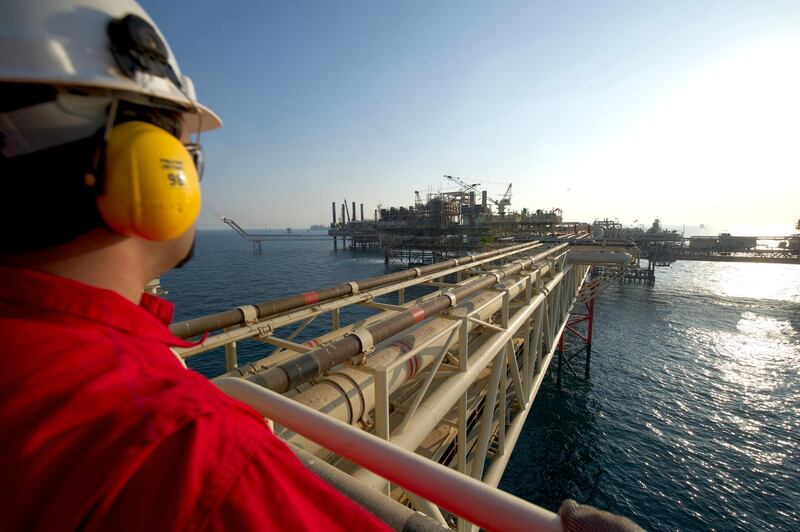Saudi Arabia and the UAE on Tuesday said they are prepared to increase crude output to address global oil market imbalances if necessary, as Opec and its allies look at ways to boost supply after 18 months of production cuts.
Saudi Arabia, the world's top oil exporter, could use its spare production capacity, which analysts place at 2 million barrels, to help balance the markets "when needed to deal with any future changes in oil supply and demand rates in co-ordination with other producing countries," the kingdom's cabinet said in a statement carried by the Saudi Press Agency.
Saudi Arabia has the largest spare capacity within Opec and the cabinet’s confirmation followed an earlier phone call between the US President Donald Trump and Saudi monarch King Salman.
The US President on Saturday tweeted that he had spoken with the Saudi monarch to bring about 2 million bpd of supply back on to the market to help lower prices, although the White House later backtracked on this claim. The announcement, which was anticipated by the oil markets pushed the West Texas Intermediate benchmark to $75.13 per barrel for the first time in three years.
_______________
Read more:
Saudi Arabia say they are ready to pump more oil to balance market
Trump blasts Opec and warns European companies against Iran ties
Oil prices fall as Saudi Arabia and Russia pump more
_______________
Brent, the benchmark for light, sweet crude traded at $78.3 at 5.20pm UAE time. The Saudi promise followed a joint statement with Russia reaffirming their earlier pledge in Vienna last month to bring a million bpd to the markets. The UAE Energy Ministry and Abu Dhabi National Oil Company Company also released statements saying they would increase production capacity to plug shortfalls in the markets, if needed. Adnoc said earlier on Tuesday that it could raise capacity by "hundreds of thousands of barrels per day" to meet shortages, if required, the company said.
Adnoc said its current crude oil production capacity was at 3.3m bpd and it was on track to raise it to 3.5m bpd by the end of 2018. The UAE and Saudi Arabia account for 4.5 per cent and 12.9 per cent of the global oil output, respectively. The kingdom and allies including Russia agreed to bring 1m bpd back on to the markets from July 1. The Opec+, as the group is known, did not reveal by how much each country would raise its production, although, Saudi Arabia and Russia are widely expected to shoulder much of the increase.
Despite Saudi Arabia’s latent 2 million bpd spare capacity, the country was unlikely to put all of it on the line, said Giovanni Staunovo, commodity analyst at UBS Wealth Management. “[Saudi Energy Minister] Khaled Al Falih mentioned at the press conference in Vienna that they will not allow the glut to develop again. They will not pump as much as they can and completely remove their spare capacity from the market just to flood the market,” he said.
The bigger question remained whether Saudi Arabia would find takers for the 2 million bpd that it could potentially bring to the market, rather than its ability to do so, noted Dallas-based independent energy expert Anas Al Hajji.
“We have seen it in 2007 and 2008, Saudi Arabia offered extra oil to the market, but no buyers,” he said.
UAE Energy Minister Suhail Al Mazrouei said on Tuesday the group will seek to maintain “overall conformity levels” for the remainder of the year.
"Opec will, from July 1, strive to adhere to the overall conformity levels for the remaining duration of the Declaration of Co-operation," he said, referring to the agreement endorsed by Opec+ to restrict production towards the end of 2016. "Opec and non-Opec countries participating in the Declaration of Co-operation remain unwavering in their commitment to contribute to market stability, in the interests of producers, consumers and the global economy," Mr Al Mazrouei added.
Russia, which is the biggest sovereign producer of crude outside of Opec, as well as Saudi Arabia and allies in the producers’ group, will look to cement their market-balancing deal into a stronger “super club” by the end of the year.
The statements by Adnoc and Mr Al Mazrouei come as Opec is under pressure from the Mr Trump to bring oil prices down, which rose to three-year highs earlier this year.
A low oil price environment would suit US domestic politics, as the country prepares to vote on midterm elections in November.
Oil prices rose to nearly $80 per barrel last month, buoyed by earlier Opec curbs as well as declines in output from Venezuela and Libya and prospects of Iranian barrels slipping from the market in the aftermath of US sanctions against the country.







